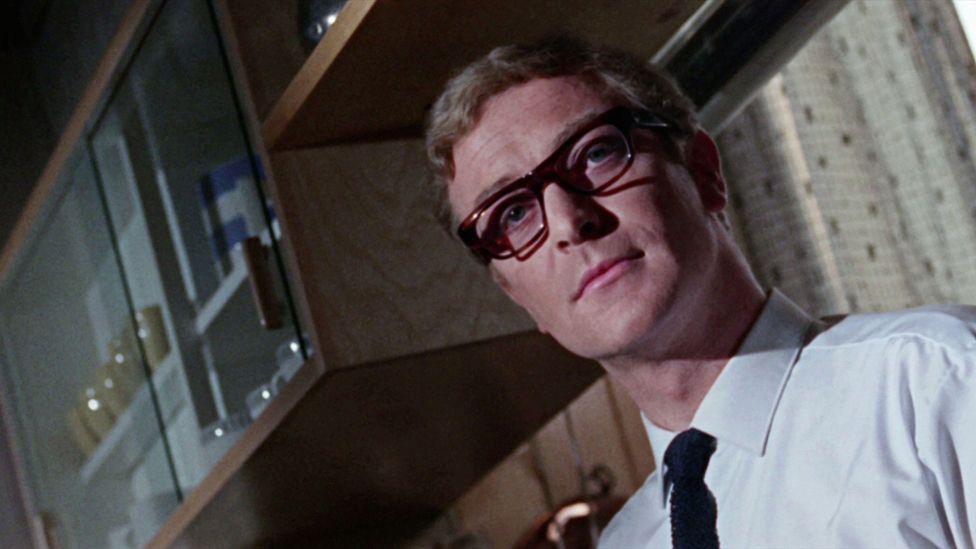The rebel spy who is the anti-Bond

In 2006, an ordinary-looking pair of spectacles went on sale at Christie’s, the London auction house. They were expected to fetch up to £3,000 ($4,088). In fact, they sold for £6,600 ($8,994), and the buyer had bought a little piece of movie history.
More like this:
– Why Bond is the ultimate spy hero
– What medical dramas – get right and wrong
– Netflix’s ‘fake heiress’ drama is a hit
The spectacles were worn by Michael Caine when he played Harry Palmer in the 1965 espionage thriller The Ipcress File. Palmer, a former soldier, is introduced in a scene in which he is woken by his alarm clock, and reaches for his glasses before he gets out of bed. He’s as blind as a bat without them – just one way in which he was not your typical action hero, certainly not back in the 60s.

The 1965 film of The Ipcress File starring Michael Caine was expressly intended to provide an alternative view of espionage to James Bond (Credit: Alamy)
In a nod to the movie, the very first shot of the new television adaptation of The Ipcress File shows Palmer’s thick-rimmed spectacles. This time, Joe Cole (perhaps best known for his role in Peaky Blinders) plays the chippy working-class spy who loves culture, cooking and women but who doesn’t have a lot of time for the posh public school boys who run British intelligence.
Like the film before it, the ITV series is based on the 1962 bestseller by the great spy novelist Len Deighton, which was published shortly after the cinema release of Dr No, the first instalment in the James Bond film franchise. Deighton’s hero – unnamed in the novel but christened Harry Palmer for the screen – was quickly identified by critics and fans as being the anti-Bond.
James Watkins, director of the six-part adaptation, explains the differences between Ian Fleming’s creation and Deighton’s agent. “Bond is a superhero,” he tells BBC Culture. “He kills without thinking or caring. He is establishment. He went to Eton. He uses his fists and his weapons more than his brain; gadgets, rather than real life.
“Harry is short sighted. Working class. Haunted by killing in Korea. A reluctant spy. Blackmailed into working for the establishment, insolent Harry is a constant thorn in their side. Trying to make his way in a world that is stacked against him. Always facing a class barrier. He’s so much more relatable than the dinosaur Bond.”
The makings of a genius thriller writer
Deighton, the London-born son of a chauffeur and a cook, wrote The Ipcress File, his first novel, on vacation in the Dordogne, France. It was, he writes in an afterword in the Penguin Modern Classics edition, a “holiday diversion”. He was a commercial artist, trained at St Martin’s School of Art and the Royal College of Art. He had worked for ad agencies and publishers, and knew Soho like the back of his hand. He had also seen a fair bit of the world, having completed two and a half years of national service with the RAF, and worked as a flight attendant with British Overseas Airways.
For The Ipcress File, he also reveals in the afterword, Deighton drew on his experiences at a smart ad agency where he had mixed with “highly educated, witty young men who had been at Eton together”. He had actually enjoyed it, especially the barbed banter, and it informed his depiction of the intelligence service offices.
Nevertheless Deighton, who is now 92 years old and retired from writing, has strong views on class and education. “I would do everything I can to prevent my children being educated in England,” he told an interviewer on Thames TV’s Afternoon Plus in 1983 (his children were at a small village school in France), “because the moment you step across the threshold of any school in England, you’ve put on a uniform for the class war. Everyone educated in England has been assigned rank badges for the class war.”
He would later acknowledge another key influence on his work. His mother sometimes cooked for Anna Wolkoff, a White Russian emigre and Nazi sympathiser who lived near to the Deighton family. In 1940, the 11-year-old Len witnessed her arrest by a group of nondescript Special Branch officers who arrived in unmarked cars. Wolkoff was subsequently imprisoned for spying activities: the incident stayed with Deighton, and made him aware that there was a secret world of espionage in which people might not be what they seemed.
The complicated plot of Ipcress involves the brainwashing of British scientists by foreign powers but it was the tone, characterisation and sardonic style that impressed readers.
Spy novelist Jeremy Duns, a fan of both Bond and Palmer, says Deighton’s espionage novels are “some of the greatest spy literature ever penned”. There are at least four novels featuring the unnamed “Harry Palmer” (maybe more – the character’s anonymity muddies the waters), and nine about the middle-aged Secret Intelligence Service officer Bernard Samson, as well as several standalone novels.

Best known for Peaky Blinders, rising star Joe Cole plays Harry Palmer in the new TV remake (Credit: ITV)
“I think the appeal of the [Harry Palmer] books and the films in the 60s was partly that the character was downbeat and relatively unglamorous, and made a contrast with the high fantasy of the Bond films,” Duns tells BBC Culture. “I think Deighton was following in the footsteps of the Angry Young Men [writers of the 1950s], and you can see a lot of the same preoccupations, rebellion against authority being the most notable, but also these were ‘kitchen sink’ spy stories: you literally saw Michael Caine in the kitchen making an omelette (though his hands were, famously, Len Deighton’s in that scene).”
From book to iconic film
In fact, though, several key members of the production team responsible for the Bond films also worked on Ipcress. Dr No’s co-producer Harry Saltzman had approached Deighton to write the follow-up film, From Russia With Love. Deighton didn’t work out as the 007 screenwriter but Saltzman decided to make The Ipcress File, with the express intention of providing an alternative view of espionage to that provided by Bond. John Barry, who scored many of the Bond films, composed the evocative Harry Palmer theme. Production designer Ken Adam, who won a Bafta for Ipcress, had a long association with the Bond franchise, making sets for seven films, from Dr No to Moonraker.
Richard Harris and Christopher Plummer reportedly passed on playing Palmer, and the part went to Michael Caine who had been a posh officer in his previous film, Zulu, and who had never before been the lead. He relished playing a role that was “more like the real me” and it made him a star.
The film really hammered home the contrast with Bond that was already evident in the novel. Where 007 was all about globe-trotting glitz, Palmer operates in a drab and dreary post-war world, a world in which tinned “champignons” – he has a favourite brand – are about as glamorous as it gets. He regards the people he works for – who are also, supposedly, his social superiors – with derision. When one boss tells him he’s being transferred, he wants to know if it will mean “any more money?”. It’s difficult to imagine Bond haggling with M over pay.
Film critics were surprised by Palmer’s spectacles. Wendy Michener in Maclean’s magazine noted that he was “the only action-type hero I can think of” who wears them. “I can’t recall remember another movie where the gal takes off the guy’s glasses before seducing him,” the Village Voice’s reviewer, Andrew Sarris, wrote.
The fact that we see Palmer cooking was also considered radical. “Food fetishism,” one critic called it. In a scene in which Palmer is preparing dinner for a beautiful colleague, pinned to the kitchen wall is one of the “cook strips” of illustrated recipes that Deighton produced for the Observer newspaper.
When it came to his attitudes to women, meanwhile, Palmer was seen as a more progressive man than Bond. Michener approvingly observed that “Palmer likes girls, but he also likes to find out if they’re willing, instead of assuming as Bond does that any normal girl should be so lucky”. And Variety noted the contrast with what it called “the Bond razamatazz” and said that Caine’s “consistent underplaying adds considerably to the pull of the picture”. The same review dubbed Palmer the “anti-Bond”.

The role of Harry Palmer’s fellow agent Jean is expanded in the new version, and played by Bohemian Rhapsody’s Lucy Boynton (Credit: ITV)
It was a success and was subsequently included on a British Film Institute list of the best 100 British films of the 20th Century (although its two hastily-produced sequels, 1966’s Funeral in Berlin and 1967’s Billion Dollar Brain, didn’t make the grade). And all of Deighton’s novels were reissued as Penguin Modern Classics last year, with his espionage fiction now acknowledged as representing a high point of the genre.
Simon Winder, publishing director at Penguin Press, says: “The Ipcress File suddenly made the spy story new – hip, dishevelled, patched together. It is as essential to the early 60s as Mary Quant or A Hard Day’s Night. Until Harry Palmer wandered on to the scene, the traditions of the English spy novel were essentially upper-class ones, with John Buchan, Ian Fleming and John le Carré the masters of the genre. Deighton transformed this assumption.”
His work has a wide appeal. Fans have included Lemmy, the hell-raising front man of rock band Motörhead, who said he never travelled without a Len Deighton novel, and the military historian Max Hastings, who calls Deighton’s World War Two novel Bomber “probably the best thing ever written about the wartime air campaign against Germany”.
And now the television series, which also stars Lucy Boynton and Tom Hollander, is set to bring Palmer and Deighton to a whole new audience. With six episodes, there is more space than there was in the film to develop characters and fill out background. Fellow agent Jean Courtney (Boynton), for example, is now much more fully rounded and is at least the professional equal of Palmer. Neither series nor movie slavishly adheres to the novel but both are faithful to its spirit. Fans will be pleased to see that TV Harry is still a good cook and a connoisseur of a proper cup of coffee.
Director James Watkins says: “In our modern world where the social mobility promised in the 60s seems to have vanished, Harry is perhaps more relevant than ever: a true working-class hero.”
The Ipcress File begins on ITV in the UK in March, and will premiere on AMC+ in the US soon.
Love film and TV? Join BBC Culture Film and TV Club on Facebook, a community for cinephiles all over the world.
If you would like to comment on this story or anything else you have seen on BBC Culture, head over to our Facebook page or message us on Twitter.
And if you liked this story, sign up for the weekly bbc.com features newsletter, called The Essential List. A handpicked selection of stories from BBC Future, Culture, Worklife and Travel, delivered to your inbox every Friday.








